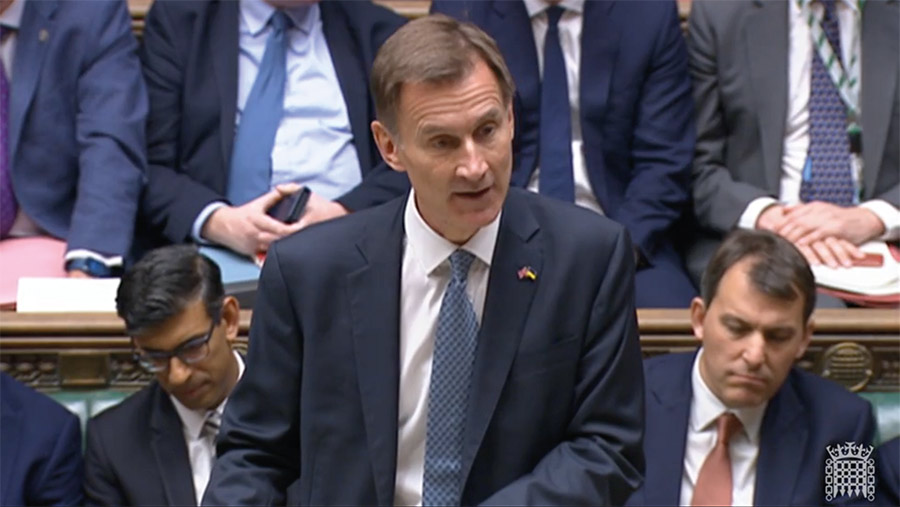Autumn Statement: What changes mean for farming
 © Parliamentlive.tv
© Parliamentlive.tv Chancellor Jeremy Hunt’s Autumn Statement, delivered today (17 November), announced a range of tax measures that will affect farm businesses.
While the changes will impact most businesses, the effects will be fairly moderate, according to advisers from the farming industry.
Mr Hunt’s plans to help plug the £55bn gap in the government’s budget were announced as the UK enters into a recession, with just less than half being funded by tax measures and the remainder from spending cuts.
See also: Advice on managing farm business cashflow
Three priorities were outlined in the autumn budget as stability, growth and public services.
Reducing inflation was listed a key target outlined by the chancellor, with the Office for Budget Responsibility predicting inflation levels at 9.1% this year and 7.4 % in 2023.
Business impacts
The chancellor’s plans mean the capital gains tax-free allowance will reduce from £12,300 to £6,000 in April 2023, and then to £3,000 in April 2024.
Sean McCann, chartered financial planner at NFU Mutual, said: “This could impact farmers selling farmland or agricultural property that has increased in value since they acquired it.”
The current £2,000 dividend allowance will be cut in half to £1,000 in April 2023, and then by a further £500 in 2024.
Lucie Hammond, partner at Hazlewoods, said this reduction will mean shareholders drawing dividends from farming companies will pay additional tax of £88-£400/year depending on their total income.
Several tax freezes are also being put in place, with the employment allowance frozen at £5,000 until March 2026. The VAT registration threshold will also be frozen until March 2026 at £85,000, which could lead to more small businesses being required to register for VAT.
Diversified farm businesses may be affected by business rates being revalued from April 2023.
Research and development tax relief will also be lowered.
Ms Hammond said many larger farming businesses trading as companies have received substantial tax relief for R&D type expenditure, and this will continue to be available, but at lower rates.
Andrew Vickery, partner and head of rural at accountants Old Mill, said the sentiment is that there is probably less excitement than we might have expected.
“We were worried about significant increases in capital gains tax, which aren’t there, and the majority of the changes will affect lots of our farming clients, but in a relatively modest way in most cases with the freezing of allowances,” he said.
Increased wages
The national living wage is set to increase from £9.50/hour to £10.42/hour for over 23-year-olds from April 2023, which will increase employment costs on farm.
Nicholas Smith, director and head of tax at Duncan & Toplis, said: “This will no doubt have a huge impact on businesses involved in the food production sector, with it being so incredibly labour-intensive.
“They will have to look carefully at their outgoings and profit margins to ensure they can absorb this sizeable increase.”
Personal tax
Income tax, personal allowance and higher rate thresholds are due to be frozen until April 2028.
The threshold for top rate of income tax will drop from £150,000 to £125,140.
Mr Vickery said: “I would expect this only to affect a modest number of farmers, although this is probably the biggest income tax change that will hit the headlines.”
Big infrastructure to stay
HS2, Northern Powerhouse rail and the East West Rail will still go ahead, as well as a new nuclear power station in Suffolk.
Industry reaction
Nick Dee, partner at Hazlewoods, said the budget was a general squeeze, with tax allowances frozen and cuts in dividend allowance and capital gains tax annual exempt amount.
“However, it’s probably not the direct impact of tax that is the most significant outcome from the Autumn Statement, but rather the general squeeze on the economy and the impact this will have on the ability of the consumer to pay the higher prices needed to deliver a return to the primary producer,” said Mr Dee.
Gary Markham, director of farms and estates at Land Family Business, said the government has announced it will allocate £79m to HMRC to tackle tax compliance risk for wealthy taxpayers.
“This means claims for reliefs such as agricultural property relief (APR) in particular could be scrutinised in the future,” said Mr Markham.
Contract and share-farming arrangements are most at risk and we are also seeing many family Agricultural Holdings Act tenancies still around, which can impact on the availability of APR, he said.
The Association of Independent Meat Suppliers suggested that more could have been said a about a needs-based approach to migrant labour for meat and poultry businesses, at least in the short term.
